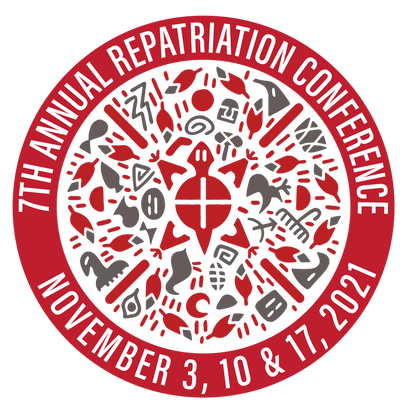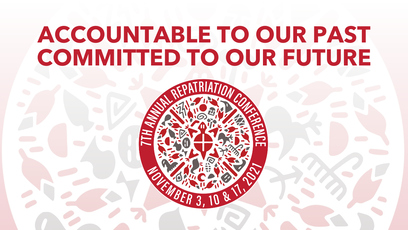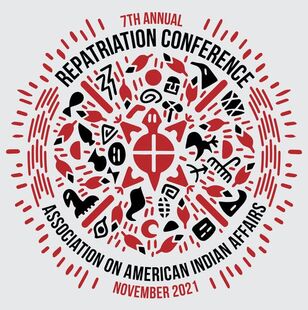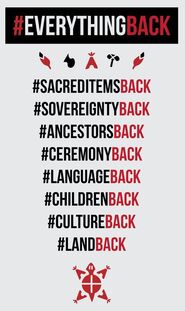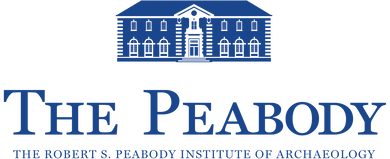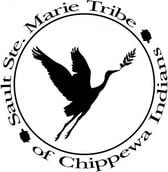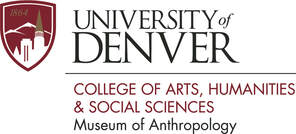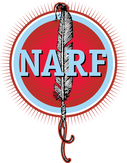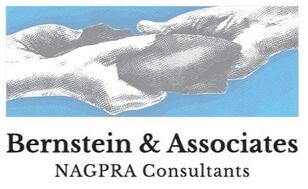7th Annual Repatriation Conference:
Accountable to Our Past, Committed to Our Future
|
The Association on American Indian Affairs hosted the 7th Annual Repatriation Conference November 1 through 19, 2021, with special events happening over three weeks including networking, workshops and keynote speakers. This was a virtual conference for everyone's safety and to increase accessibility.
The Conference theme – Accountable to Our Past, Committed to Our Future – was realized through interactive, virtual panels led by experts from diverse backgrounds within Tribal governments including Tribal repatriation practitioners and spiritual leaders, museums, academia, dealers and auctions, federal agencies, foreign museums, and legal counsel. These experts and partners shared examples and case studies where there has been a reckoning of history, and teach us about the process – using NAGPRA or other laws, or through consensual actions and best practices. The Conference provided connection, ceremony and healing for participants, while also providing education and training for everyone committed to healing the past. Participants came together for a variety of relevant panel discussions, breakout sessions, workshops, and networking opportunities to unite all participants in one mind in order to envision a world where diverse Native American cultures and values are lived, protected, and respected. |
An ALL VIRTUAL Community Conference
|
FREE Educational Videos Now Available on YouTube
|
Back to Basics: NAGPRA 101
The NAGPRA process comes with legal obligations that museums and federal agencies must fulfil and confirms legal rights of Indian Tribes, Alaska Natives, and Native Hawaiian organizations. This workshop will explore the administrative process by looking at the requirements and opportunities written into the law and the regulations. Participants will receive an overview of the letter of the law as well as a comprehensive guide to the decision-making process under NAGPRA.
|
Getting it Done is Getting it Right: Broadening Perspectives on Cultural Affiliation - COMING SOON
This session explores cultural affiliation from a broad approach, enabling Native Nations to take the lead on repatriation, and working beyond the legacy of colonialism currently upheld by some institutions. NAGPRA does not require institutions to determine “scientific” cultural affiliation; it requires institutions to complete the legal process.
Nothing That Deserved the Name of Purchase Was Made: The Implications of Patrimony and Ethics on Returning Diplomatic Items
For 25 years, the Stockbridge-Munsee Band of Mohican Indians have been recovering objects associated with their Sachem John Quinney. Participants in this panel reflect on how the concept of “cultural patrimony,” a term that implies both frozen and dynamic history, has aided or hindered these efforts.
Building Strength: The Importance of Indigenous Coalitions
The panelists discuss the importance of building Tribal Coalitions in order to successfully protect cultural heritage and restore culture as well as spirit and healing. Both successes and hardships will be examined from members of current Tribal Coalitions across Indian Country.
NAGPRA Regulations: An Opportunity to Decolonize Museums, Federal Agencies and Beyond
The Department of the Interior recently released a comprehensive revision of the NAGPRA regulations for Tribal consultation purposes. The revision showed that Interior understands that the current regulations are problematic and are looking for ways to simplify the processes and shift the burden back on institutions instead of Tribes. The presenters will talk about real situations and see if the new regulations can provide a better solution to support graves protection and repatriation.
Changing Perspectives on Native American Cultural Heritage
What is Native American Art and who is that Art for? What is the difference between a Sacred object, and the Art that is inspired by the Sacred? We are in a time of transformation that is working to end the western or Euro-centric ideology that has declared itself as the primary expert in Native American and Indigenous Arts and Cultures. Participate in this round-table discussion as we explore these significant changes in the meanings of art, culture and repatriation.
Story of Success! Sisseton Wahpeton Oyate: Looking Back over 30 Years of NAGPRA
This session explores cultural affiliation broadly, enabling Native peoples to take the lead on repatriation, and working beyond the legacy of colonialism currently upheld by some institutions. NAGPRA does not require institutions to determine scientifically correct cultural affiliation; it requires institutions to consult with Tribes and affiliate.
Chat with the National Museum of the American Indian
Staff at the National Museum of the American Indian answers questions about the Smithsonian’s NMAI Act and their repatriation process.
How to Train Your Lawyer
Lawyers can be helpful in preserving cultural heritage, but only if they are adequately oriented to specific values of their client – the Tribe who has hired them. Lawyers must be educated, and sometimes, re-educated, in cultural values of the Native Nation and the core issues at hand. This panel will discuss difficulties and solutions from painful experiences directly from attorneys, and discuss the importance of legal advice in NAGPRA implementation.
Story of Success! Southeast Alaska Tribal and Clan Response: When Our Ancestors Return - COMING SOON
Southeast Alaska Tribes have successfully utilized NAGPRA to return funerary and objects of cultural patrimony to individual clans. Through collaborative research with Central Council Tlingit and Haida Indian Tribes of Alaska Natural Resources Department and Yakutat Tlingit Tribe, successful repatriation is occurring, clan histories are being retold, and new practices are being created.
KEYNOTE: SUZAN SHOWN HARJO, Cheyenne & Hodulgee Muscogee
Suzan’s advocacy, accomplishments and awards are vast, from protecting Ancestors, Sacred Places and cultural rights to curating, writing and presenting on treaties, sovereignty, arts and history. Suzan’s activism is rooted in the timeless traditions of the Cheyenne and Muscogee Nations and in the Native resistance of the 1800s and 1900s. Suzan will address reclamation and restoration, then and now, in the age and depth of the selfie and hashtag culture.
Keynote: Dr. MARGE BRUCHAC, Abenaki
Restorative Repatriation: Case Histories in Heritage Search and Recovery
Despite NAGPRA, Indigenous Nations still struggle with the challenge of locating and recovering lost and stolen cultural heritage. Restorative research is needed, including critical studies of archaeological, museological, artistic, and other collecting processes that separated Indigenous cultural heritage from their homes. Marge offers discussion of several successful cases of regional repatriation that involved voluntary returns of objects held by multiple individuals and institutions. Marge is the Coordinator, Native American & Indigenous Studies, and Associate Professor of Anthropology, for the Department of Anthropology, University of Pennsylvania.
A History of Plunder and Dispossession
This panel explores the governmental and military policies that led to the loss of Ancestors and Sacred Belongings. It provides a canvas for communities to examine their own personal losses and a means to protect cultural heritage in the future through their own laws.
Protecting Sacred Places – Save Oak Flat
Chi'chil Biłdagoteel (Oak Flat) is a sacred site for the Apache and many other Native Nations. Hear from spiritual leaders and members of the Apache Stronghold, as they discuss their efforts to continue to protect Chi'chil Biłdagoteel (Oak Flat) from colonization and development.
Texas Indians Reimagine the Future of Repatriation
Repatriation of Coahuiltecan ancestors has been burdened by the unique colonization of Indigenous Peoples in the current geography of Texas, NAGPRA’s shortcomings, and institutional obstructions. A 2016 successful NAGPRA outcome through institutional collaboration, and recent successful student-centered campaigns, reimagine repatriation efforts that unite all Indigenous Peoples for action that has national implications for the future of repatriation.
When Our Heritage is Taken: Investigation and Enforcement Mechanisms
When Native American cultural heritage is taken, there are various laws that may apply to help return those items. Learn more about the commercial market, civil and criminal investigation, and what law enforcement look for when stolen and looted objects have been taken.
Strategies for Meaningful Virtual Consultation
This session will explore the ways in which meaningful consultation can take place in virtual settings. The panel will provide examples of the advantages and drawbacks of virtual consultation.
Story of Success! Northern Arapaho NAGPRA Repatriations - COMING SOON
The session summarizes the repatriation of three Northern Arapaho Children buried at Carlisle Indian Industrial School for the last 134 years, and how assimilation and erasure culture at that time saw many Native American sacred objects displaced like Chief Black Coal’s Trail War bonnet.
Looking Back: Stories from the NAGPRA Review Committee
The NAGPRA Review Committee oversees the implementation of the Repatriation provisions in NAGPRA. Join both current and former members of the NAGPRA Review Committee for a discussion about the importance of the Review Committee and hear stories of how NAGPRA has created burdens as well as successes directly from those who served on the Review Committee.
A Virtual Look at Tribal Museums & Collaborations
Take a look at some Tribal Museums and a Tribal collaborative project and talk with Tribal museum staff about some favorite exhibits and the importance of Tribal museums to Indian Country.
Learn about the ARTIVE Database for Protecting Cultural Heritage
ARTIVE strives to use cutting edge and emerging technology in cataloging, registering, and recording objects, claims, interests, and documentation to protect art and cultural heritage. Commercial stakeholders in the development and financial sectors can use ARTIVE’s database to gain insight into an objects' status and manage risk when planning projects or investments into collections, especially when those collections are from Indigenous Nations whose voices have been ignored.
International Repatriation: No NAGPRA - No Problem
This panel will explore repatriation practices at institutions internationally with multiple representatives of European museums and opportunities to build relationships with these foreign institutions.
International Repatriation Success: Karl May Museum & Sault Ste. Marie Tribe of Chippewa Indians
Learn about how an 8-year long international repatriation case resulted in a successful repatriation of an Ancestor, through collaboration and trust between multiple entities and governments.
Updates on a New UN Mechanism for International Repatriation - COMING SOON
This session will report on progress and next steps for the establishment a new United Nations mechanism for international repatriation of Indigenous Peoples Ancestors, funerary objects, sacred items and objects of cultural patrimony. Learn about the positive developments in the 18-year struggle for repatriation of the Yaqui Maaso Kova from Sweden.
Strengthening Legislation and Policy to Protect Cultural Heritage
What are we doing now to protect Native American cultural heritage? What can we all advocate for to strengthen repatriation and protections for Native American cultural heritage. Learn more about research, federal perspectives, changing trends, and policy and legislative advocacy that we can all support.
Chat with the Department of Interior and State Department about International Repatriation - COMING SOON
This is not a formal presentation but an opportunity to ask questions and discuss issues about how the Department of the Interior and State Department can assist with repatriation matters overseas.
Returning Our Children Home: Rosebud Sioux Tribe Repatriation of Sicangu Youth Buried at Carlisle Boarding School - COMING SOON
Learn about the Sicangu Youth Council and Tokala Inajinyo Youth Mentors’ experiences of repatriating their relatives home from the Carlisle Indian Industrial Boarding School.
Keynote: Dr. SONYA ATALAY, Anishinaabe-Ojibwe - COMING SOON
Repatriation as a Teacher: Reclaiming, Wellbeing, and Healthy Indigenous Futures
Sonya is an Indigenous archaeologist and Provost Professor in the Anthropology Department at the University of Massachusetts, Amherst. Sonya utilizes community-based participatory methods to conduct research in full partnership with Indigenous communities. She is exploring ways that repatriation and reclaiming of tangible and intangible heritage are teachers that provides essential lessons for decolonizing and Indigenizing institutions. This work will be published in her forthcoming “Braiding Knowledge: How Indigenous Knowledge is Challenging and Changing Universities,” published by University of Arizona Press.
RED HOOP TALK: The Repatriation Conference Special
Join us with some of our speakers at the Conference for an interactive event and help us close out our Conference activities.
This session explores cultural affiliation from a broad approach, enabling Native Nations to take the lead on repatriation, and working beyond the legacy of colonialism currently upheld by some institutions. NAGPRA does not require institutions to determine “scientific” cultural affiliation; it requires institutions to complete the legal process.
- Megan Cook, Director of Archaeology Collections, Mississippi Department of Archives and History
- Amber Hood, Chickasaw, Director of Historic Preservation and Repatriation at the Chickasaw Nation
- Melanie O’Brien, Program Manager, National NAGPRA Program
Nothing That Deserved the Name of Purchase Was Made: The Implications of Patrimony and Ethics on Returning Diplomatic Items
For 25 years, the Stockbridge-Munsee Band of Mohican Indians have been recovering objects associated with their Sachem John Quinney. Participants in this panel reflect on how the concept of “cultural patrimony,” a term that implies both frozen and dynamic history, has aided or hindered these efforts.
- Bonney Hartley, Stockbridge-Munsee Mohican, Tribal Historic Preservation Manager for Stockbridge-Munsee Community
- Meadhbh Ginnane, Heritage Studies Graduate Student, University of Cambridge
- Quentin Lewis, Collections and Programs Manager at the Yager Museum of Art & Culture, Hartwick College
- Mark Wilson, Curator at the Mission House, a property of The Trustees of Reservations
Building Strength: The Importance of Indigenous Coalitions
The panelists discuss the importance of building Tribal Coalitions in order to successfully protect cultural heritage and restore culture as well as spirit and healing. Both successes and hardships will be examined from members of current Tribal Coalitions across Indian Country.
- RaeLynn A. Butler, The Muscogee Nation, Historic and Cultural Preservation Department, Manager
- Kamakana Ferreira, Lead Compliance Specialist, Office of Hawaiian Affairs
- William Johnson, Saginaw Chippewa, Interim Director of the Ziibiwing Center of Anishinabe Culture & Lifeways
- Shannon Martin, Gun Lake Pottawatomi & Ojibwe, Lynx Clan, Executive Director & Founder of Cultural Pathways Group, LLC
NAGPRA Regulations: An Opportunity to Decolonize Museums, Federal Agencies and Beyond
The Department of the Interior recently released a comprehensive revision of the NAGPRA regulations for Tribal consultation purposes. The revision showed that Interior understands that the current regulations are problematic and are looking for ways to simplify the processes and shift the burden back on institutions instead of Tribes. The presenters will talk about real situations and see if the new regulations can provide a better solution to support graves protection and repatriation.
- Melanie O’Brien, Program Manager, National NAGPRA Program
- Shannon O’Loughlin, Citizen of the Choctaw Nation of Oklahoma, CEO & Attorney for the Association on American Indian Affairs
- Dr. Veronica Pasfield, Bay Mills Indian Community, NAGPRA Officer, Journalist, Independent Curator & Museum Decolonizer
- Judith Shapiro, Attorney, Big Fire Law & Policy Group LLP
- Dr. Wendy Teeter, Senior Curator of Archaeology, Fowler Museum at UCLA & UCLA Repatriation Coordinator, and Lecturer, UCLA American Indian Studies
Changing Perspectives on Native American Cultural Heritage
What is Native American Art and who is that Art for? What is the difference between a Sacred object, and the Art that is inspired by the Sacred? We are in a time of transformation that is working to end the western or Euro-centric ideology that has declared itself as the primary expert in Native American and Indigenous Arts and Cultures. Participate in this round-table discussion as we explore these significant changes in the meanings of art, culture and repatriation.
- Cinnamon Catlin-Legutko, Museum Director, Illinois State Museum
- Dallin Maybee, Northern Arapaho & Seneca, Artist and Assistant Director of Development, Native American Rights Fund
- Debra Yepa-Pappan, Pueblo of Jemez, Korean, Artist and Community Engagement Coordinator at the Field Museum
Story of Success! Sisseton Wahpeton Oyate: Looking Back over 30 Years of NAGPRA
This session explores cultural affiliation broadly, enabling Native peoples to take the lead on repatriation, and working beyond the legacy of colonialism currently upheld by some institutions. NAGPRA does not require institutions to determine scientifically correct cultural affiliation; it requires institutions to consult with Tribes and affiliate.
- Dianne DesRosiers, Tribal Historic Preservation Officer, Sisseton Wahpeton Sioux Tribe of the Lake Traverse Reservation of South Dakota
- Tamara St. John, Archivist/Curator, Sisseton Wahpeton Sioux Tribe of the Lake Traverse Reservation of South Dakota
Chat with the National Museum of the American Indian
Staff at the National Museum of the American Indian answers questions about the Smithsonian’s NMAI Act and their repatriation process.
- Jacquetta “Jackie” Swift, Comanche & Ft. Sill Apache, Repatriation Manager, NMAI
- Lauren Sieg, Repatriation Researcher
- Risa Arbolino, Repatriation Researcher
- Samantha Hixson, Repatriation Researcher
- Nancy Kenet Vickery, Repatriation Program Analyst
How to Train Your Lawyer
Lawyers can be helpful in preserving cultural heritage, but only if they are adequately oriented to specific values of their client – the Tribe who has hired them. Lawyers must be educated, and sometimes, re-educated, in cultural values of the Native Nation and the core issues at hand. This panel will discuss difficulties and solutions from painful experiences directly from attorneys, and discuss the importance of legal advice in NAGPRA implementation.
- Ernestine Berry, John Hair Culture Center, Executive Director
- Nicole Ducheneaux, Cheyenne River Sioux Tribe, Attorney, Big Fire Law & Policy Group LLP
- Shannon O’Loughlin, Citizen of the Choctaw Nation of Oklahoma, CEO & Attorney for the Association on American Indian Affairs
- Judith Shapiro, Attorney, Big Fire Law & Policy Group LLP
Story of Success! Southeast Alaska Tribal and Clan Response: When Our Ancestors Return - COMING SOON
Southeast Alaska Tribes have successfully utilized NAGPRA to return funerary and objects of cultural patrimony to individual clans. Through collaborative research with Central Council Tlingit and Haida Indian Tribes of Alaska Natural Resources Department and Yakutat Tlingit Tribe, successful repatriation is occurring, clan histories are being retold, and new practices are being created.
- Gail Dabaluz, Tlingit/Haida/Tsimshian Tribe Yéil (Raven) Moiety, University of Alaska Fairbanks
- Judy Ramos, Tlingit Tribe Yéil (Raven) Moiety, University of Alaska
KEYNOTE: SUZAN SHOWN HARJO, Cheyenne & Hodulgee Muscogee
Suzan’s advocacy, accomplishments and awards are vast, from protecting Ancestors, Sacred Places and cultural rights to curating, writing and presenting on treaties, sovereignty, arts and history. Suzan’s activism is rooted in the timeless traditions of the Cheyenne and Muscogee Nations and in the Native resistance of the 1800s and 1900s. Suzan will address reclamation and restoration, then and now, in the age and depth of the selfie and hashtag culture.
Keynote: Dr. MARGE BRUCHAC, Abenaki
Restorative Repatriation: Case Histories in Heritage Search and Recovery
Despite NAGPRA, Indigenous Nations still struggle with the challenge of locating and recovering lost and stolen cultural heritage. Restorative research is needed, including critical studies of archaeological, museological, artistic, and other collecting processes that separated Indigenous cultural heritage from their homes. Marge offers discussion of several successful cases of regional repatriation that involved voluntary returns of objects held by multiple individuals and institutions. Marge is the Coordinator, Native American & Indigenous Studies, and Associate Professor of Anthropology, for the Department of Anthropology, University of Pennsylvania.
A History of Plunder and Dispossession
This panel explores the governmental and military policies that led to the loss of Ancestors and Sacred Belongings. It provides a canvas for communities to examine their own personal losses and a means to protect cultural heritage in the future through their own laws.
- Chip Colwell, PhD, Anthropologist and Editor with SAPIENS
- Robert Hershey, Clinical Professor of Law Emeritus, Indigenous Peoples Law & Policy Program, University of Arizona College of Law
- Stewart Koyiyumptewa, Program Manager, Hopi Historic Cultural Preservation Office
- Dr. Richard Luarkie, Pueblo of Laguna, Former Governor
- Ramon Riley, Cultural Resource Director, White Mountain Apache Museum
Protecting Sacred Places – Save Oak Flat
Chi'chil Biłdagoteel (Oak Flat) is a sacred site for the Apache and many other Native Nations. Hear from spiritual leaders and members of the Apache Stronghold, as they discuss their efforts to continue to protect Chi'chil Biłdagoteel (Oak Flat) from colonization and development.
- Vernelda Grant, Director of the San Carlos Apache Tribe Archaeology Department, Tribal Historic Preservation Officer & Apache Stronghold Member
- Dr. Wendsler Nosie, Sr., Former Chairman of the San Carlos Apache Tribe & Founder of the Apache Stronghold
- Vanessa Nosie, Archaeology Assistant for the San Carlos Apache Tribe Archaeology Department, Apache Stronghold Member
- Naelyn Pike, Secretary in the Office of the Chair for San Carlos Apache Tribe & Apache Stronghold Member
Texas Indians Reimagine the Future of Repatriation
Repatriation of Coahuiltecan ancestors has been burdened by the unique colonization of Indigenous Peoples in the current geography of Texas, NAGPRA’s shortcomings, and institutional obstructions. A 2016 successful NAGPRA outcome through institutional collaboration, and recent successful student-centered campaigns, reimagine repatriation efforts that unite all Indigenous Peoples for action that has national implications for the future of repatriation.
- Emily Aguilar, Coahuiltecan, Indigenous Cultures Center Project Coordinator, Indigenous Cultures Institute
- Dr. Ruben A. Arellano, Miakan-Garza Band of the Coahuiltecan People, Professor of History, Dallas College, Texas
- Dr. Mario Garza, Miakan-Garza Band of the Coahuiltecan People, Cultural Preservation Officer, Indigenous Cultures Institute Board of Elders Chair
- Maria Rocha, Miakan-Garza Band of the Coahuiltecan People, Indigenous Cultures Institute, Executive Director
When Our Heritage is Taken: Investigation and Enforcement Mechanisms
When Native American cultural heritage is taken, there are various laws that may apply to help return those items. Learn more about the commercial market, civil and criminal investigation, and what law enforcement look for when stolen and looted objects have been taken.
- David Barland-Liles, Law Enforcement Program Manager of Effigy Mounds National Monument, and National NAGPRA Office Investigator
- Colleen Medicine, Sault Ste. Marie Tribe of Chippewa Indians, Program Director, Association on American Indian Affairs
- Andrew Meyer, Doctoral Candidate, École des Hautes Études en Sciences Sociales
- Kyle T. Nayback, Supervisory Assistant US Attorney, Indian Country Crimes Section, U.S. Attorney’s Office, District of New Mexico
- David Tarler, Training, Civil Enforcement, and Regulations, National NAGPRA Program
Strategies for Meaningful Virtual Consultation
This session will explore the ways in which meaningful consultation can take place in virtual settings. The panel will provide examples of the advantages and drawbacks of virtual consultation.
- Emma Noffsinger, Museum Specialist in Collections, National Museum of American Indian
- Sarah O’Donnell, NAGPRA Coordinator, Osage Nation
- Jane Richardson, Associate, Bernstein & Associates NAGPRA Consultants
- Jen Shannon, Curator & Associate Professor of Cultural Anthropology, University of Colorado Museum of Natural History
- Claire Wilbert, Associate, Bernstein & Associates NAGPRA Consultants
Story of Success! Northern Arapaho NAGPRA Repatriations - COMING SOON
The session summarizes the repatriation of three Northern Arapaho Children buried at Carlisle Indian Industrial School for the last 134 years, and how assimilation and erasure culture at that time saw many Native American sacred objects displaced like Chief Black Coal’s Trail War bonnet.
- Crystal C’Bearing, Northern Arapaho, Tribal Historic Preservation Office Deputy Director
- Chairman Jordan Dresser, Northern Arapaho, Northern Arapaho Tribal Chairman and Northern Arapaho NAGPRA Curator
- Yufna Soldier Wolf, Northern Arapaho, Former Northern Arapaho Tribal Historic Preservation Officer and NAGPRA Coordinator
Looking Back: Stories from the NAGPRA Review Committee
The NAGPRA Review Committee oversees the implementation of the Repatriation provisions in NAGPRA. Join both current and former members of the NAGPRA Review Committee for a discussion about the importance of the Review Committee and hear stories of how NAGPRA has created burdens as well as successes directly from those who served on the Review Committee.
- C. Timothy McKeown PhD, Legal anthropologist and repatriation consigliere, National Association of Tribal Historic Preservation Officers
- Dan Monroe, Former Peabody Essex Museum Director and CEO
- Shannon O’Loughlin, Citizen of the Choctaw Nation of Oklahoma, CEO & Attorney for the Association on American Indian Affairs
- Lauren Peters, PhD scholar, UC Davis
- Dr. Rosita Kaaháni Worl, Tlingit, Shangukeidí-Thunderbird Clan and House Lowered from the Sun in Klukwan. A Chilkat and Grandchild of the Lukaax.ádi-Sockeye Clan, Sealaska Heritage Institute, President
A Virtual Look at Tribal Museums & Collaborations
Take a look at some Tribal Museums and a Tribal collaborative project and talk with Tribal museum staff about some favorite exhibits and the importance of Tribal museums to Indian Country.
- Shana Bushyhead Condill, citizen of the Eastern Band of Cherokee Indians, Executive Director showcasing the Museum of the Cherokee Indian
- Ivana Lopez Espinosa, DEI Manager, Dr. Anthony J. Kolenic, Director, Dr. David Michener, Curator & Shannon Martin, Gun Lake Pottawatomi & Ojibwe, showcasing the Matthaei Botanical Gardens & Nichols Arboretum
- Fran Parchcorn, Special Events Director, showcasing the Chickasaw Cultural Center
- Joe Stahlman, Seneca Nation of Indians, Director of and showcasing the Seneca-Iroquois National Museum
- Gena R. Timberman, citizen of the Choctaw Nation of Oklahoma, Luksi Group LLC, showcasing her favorite part of the First Americans Museum in Oklahoma
Learn about the ARTIVE Database for Protecting Cultural Heritage
ARTIVE strives to use cutting edge and emerging technology in cataloging, registering, and recording objects, claims, interests, and documentation to protect art and cultural heritage. Commercial stakeholders in the development and financial sectors can use ARTIVE’s database to gain insight into an objects' status and manage risk when planning projects or investments into collections, especially when those collections are from Indigenous Nations whose voices have been ignored.
- Khamal Patterson, Esq., Cultural Property Law Analyst
International Repatriation: No NAGPRA - No Problem
This panel will explore repatriation practices at institutions internationally with multiple representatives of European museums and opportunities to build relationships with these foreign institutions.
International Repatriation Success: Karl May Museum & Sault Ste. Marie Tribe of Chippewa Indians
Learn about how an 8-year long international repatriation case resulted in a successful repatriation of an Ancestor, through collaboration and trust between multiple entities and governments.
- Ashley Fry, Indigenous Affairs Officer, United States Department of State
- Colleen Medicine, Ojibwe, Anishinaabe, Program Director, Association on American Indian Affairs
- David Mees, Embassy of the United States of America in Berlin
- Cecil E. Pavlat Sr., Anishinaabemowin Instructor & Elder Advisor, Sault Ste. Marie Tribe of Chippewa Indians
- Marie Richards, Sault Ste. Marie Tribe of Chippewa Indians, Repatriation & Historic Preservation Specialist
Updates on a New UN Mechanism for International Repatriation - COMING SOON
This session will report on progress and next steps for the establishment a new United Nations mechanism for international repatriation of Indigenous Peoples Ancestors, funerary objects, sacred items and objects of cultural patrimony. Learn about the positive developments in the 18-year struggle for repatriation of the Yaqui Maaso Kova from Sweden.
- Andrea Carmen, Yaqui Nation, International Indian Treaty Council
- Kristen Carpenter, Council Tree Professor of Law and Director of the American Indian Law Program, University of Colorado Law School
- Chairman Peter S. Yucupicio, Chairman, Pascua Yaqui Tribe of Arizona
Strengthening Legislation and Policy to Protect Cultural Heritage
What are we doing now to protect Native American cultural heritage? What can we all advocate for to strengthen repatriation and protections for Native American cultural heritage. Learn more about research, federal perspectives, changing trends, and policy and legislative advocacy that we can all support.
- Katie Klass, Wyandotte Nation, Partner, Hobbs Straus Dean & Walker
- Jamie Meuwissen, Senior Analyst, Government Accountability Office
- Shannon O’Loughlin, Citizen of the Choctaw Nation of Oklahoma, CEO & Attorney, Association on American Indian Affairs
Chat with the Department of Interior and State Department about International Repatriation - COMING SOON
This is not a formal presentation but an opportunity to ask questions and discuss issues about how the Department of the Interior and State Department can assist with repatriation matters overseas.
- David Downes, Chief, Policy Division Office of International Affairs, Department of the Interior
- Ashley Fry, Indigenous Affairs Officer, United States Department of State
- Brooke Hobbie, Office of International Affairs, Department of the Interior
Returning Our Children Home: Rosebud Sioux Tribe Repatriation of Sicangu Youth Buried at Carlisle Boarding School - COMING SOON
Learn about the Sicangu Youth Council and Tokala Inajinyo Youth Mentors’ experiences of repatriating their relatives home from the Carlisle Indian Industrial Boarding School.
- Christopher Eagle Bear, Rosebud Sioux Tribe
- Sydney Horse Looking, Rosebud Sioux Tribe
- Rachel Janis, Rosebud Sioux Tribe
- Alexis White Hat, Rosebud Sioux Tribe
- JaydenRose Whiting, Rosebud Sioux Tribe
Keynote: Dr. SONYA ATALAY, Anishinaabe-Ojibwe - COMING SOON
Repatriation as a Teacher: Reclaiming, Wellbeing, and Healthy Indigenous Futures
Sonya is an Indigenous archaeologist and Provost Professor in the Anthropology Department at the University of Massachusetts, Amherst. Sonya utilizes community-based participatory methods to conduct research in full partnership with Indigenous communities. She is exploring ways that repatriation and reclaiming of tangible and intangible heritage are teachers that provides essential lessons for decolonizing and Indigenizing institutions. This work will be published in her forthcoming “Braiding Knowledge: How Indigenous Knowledge is Challenging and Changing Universities,” published by University of Arizona Press.
RED HOOP TALK: The Repatriation Conference Special
Join us with some of our speakers at the Conference for an interactive event and help us close out our Conference activities.

